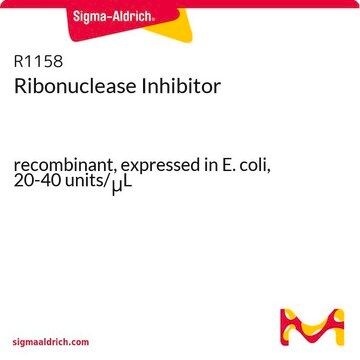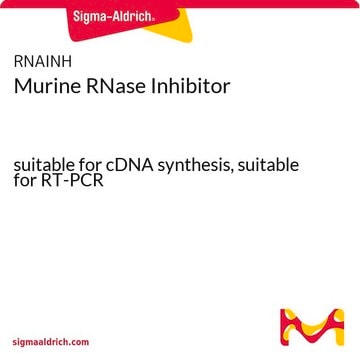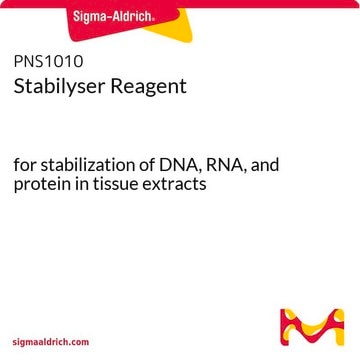R7397
ProtectRNA™ RNase Inhibitor 500× Concentrate
RNase inhibitor for in situ hybridization assays
Synonyme(s) :
Ribonuclease inhibitor ProtectRNA™
Se connecterpour consulter vos tarifs contractuels et ceux de votre entreprise/organisme
About This Item
Code UNSPSC :
41106300
Nomenclature NACRES :
NA.52
Produits recommandés
Forme
liquid
Température de stockage
2-8°C
Description générale
Not recommended in systems where other enzymatic activity is required.
ProtectRNA™ ribonuclease(RNase) Inhibitor inhibits most nucleic acid binding enzymes such as RNase and DNase, reverse transcriptase, some RNA and DNA polymerases, protein synthesis enzymes, and several restriction endonucleases. In contrast, ProtectRNA does not interfere with DNA and RNA hybridizations. The action ofProtectRNA as a nuclease inhibitor can be used as an advantage for in situ hybridization. ProtectRNA is useful during all steps of in situ hybridization for tissue RNA protection from RNase degradation. It is recommended to add ProtectRNA to all aqueous solutions used, from as early as the deparaffinization step until the hybridization is completed.
ProtectRNA™ ribonuclease(RNase) Inhibitor inhibits most nucleic acid binding enzymes such as RNase and DNase, reverse transcriptase, some RNA and DNA polymerases, protein synthesis enzymes, and several restriction endonucleases. In contrast, ProtectRNA does not interfere with DNA and RNA hybridizations. The action ofProtectRNA as a nuclease inhibitor can be used as an advantage for in situ hybridization. ProtectRNA is useful during all steps of in situ hybridization for tissue RNA protection from RNase degradation. It is recommended to add ProtectRNA to all aqueous solutions used, from as early as the deparaffinization step until the hybridization is completed.
Application
ProtectRNA™ RNase Inhibitor 500× Concentrate has been used in:
- RNA extraction
- tissue sectioning and staining for laser capture microscopy
- the isolation of blood vessels from hippocampi
ProtectRNA™ RNase Inhibitor 500× Concentrate is an RNase inhibitor.
A potent inhibitor of most nucleic acid binding enzymes, and thus useful as an RNase inhibitor. Especially useful when performing in situ hybridization. If it is added to all aqueous solutions used, it eliminates the need for special glassware washing and after-wash treatments. The 500x concentrate is economical; 2 ml treats 1,000 ml of solution. Not recommended in systems where other enzymatic activity is required.
Caractéristiques et avantages
- The 500× concentrate is economical
- Eliminates the need for special dishwashing and“after washing” cleaning and treatments.
Quantité
2mL treats 1,000ml of solution.
Autres remarques
This product is for R&D use only, not for drug, household, or other uses.
Informations légales
ProtectRNA is a trademark of Sigma-Aldrich Co. LLC
Mention d'avertissement
Warning
Mentions de danger
Conseils de prudence
Classification des risques
Flam. Liq. 3 - Met. Corr. 1
Code de la classe de stockage
3 - Flammable liquids
Classe de danger pour l'eau (WGK)
WGK 2
Point d'éclair (°F)
140.0 °F - closed cup
Point d'éclair (°C)
60 °C - closed cup
Certificats d'analyse (COA)
Recherchez un Certificats d'analyse (COA) en saisissant le numéro de lot du produit. Les numéros de lot figurent sur l'étiquette du produit après les mots "Lot" ou "Batch".
Déjà en possession de ce produit ?
Retrouvez la documentation relative aux produits que vous avez récemment achetés dans la Bibliothèque de documents.
Les clients ont également consulté
Potential neurotoxicity of titanium implants: Prospective, in-vivo and in-vitro study
Shahar S, et al.
Biomaterials, 276, 121039-121039 (2021)
Exposing the Three-Dimensional Biogeography and Metabolic States of Pathogens in Cystic Fibrosis Sputum via Hydrogel Embedding, Clearing, and rRNA Labeling.
DePas WH
mBio, 7(5), e00796-e00716 (2016)
Intestinal epithelial cells express immunomodulatory ISG15 during active ulcerative colitis and Crohn?s disease
?stvik AE, et al.
Journal of Crohn's & Colitis, 14(7), 920-934 (2020)
Recovery of high-quality RNA from laser capture microdissected human and rodent pancreas.
Butler AE
Journal of Histotechnology, 39(2), 59-65 (2016)
Gene expression analysis of interferon kappa in laser capture microdissected cervical epithelium.
DeCarlo CA
Analytical Biochemistry, 381(1), 59-66 (2008)
Notre équipe de scientifiques dispose d'une expérience dans tous les secteurs de la recherche, notamment en sciences de la vie, science des matériaux, synthèse chimique, chromatographie, analyse et dans de nombreux autres domaines..
Contacter notre Service technique












